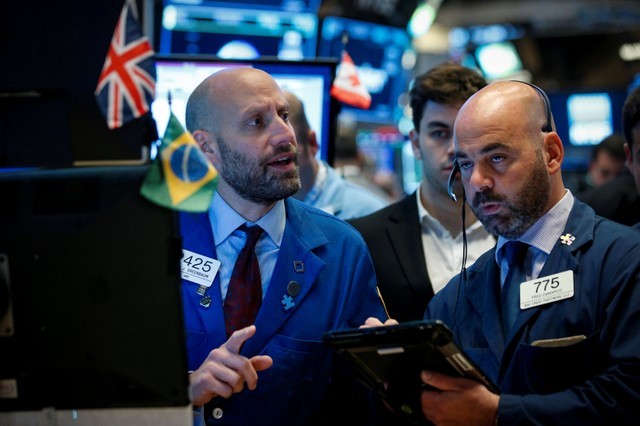By Laila Kearney
NEW YORK (Reuters) – Struggling health sector shares and U.S.-driven trade confrontations capped gains in global stocks and drove down safe-haven U.S. Treasury and German Bund yields on Thursday, while financial companies boosted Wall Street.
Wall Street was slightly higher in afternoon trading, but gains were largely capped by plummeting shares of drug distributors and retailers after Amazon announced it would expand in that business.
The S&P health sector dropped 0.12 percent, the most among the 11 S&P sectors, while Amazon gained 2 percent. The biggest losses included a 9.4 percent drop in Walgreens Boots Alliance, a 6.5 percent tumble in CVS Health and a 10.7 percent fall in Rite Aid.
Still, gains in financials for the first time in 14 days bolstered Wall Street and helped keep global shares largely flat.[.N]
The Dow Jones Industrial Average rose 111.53 points, or 0.46 percent, to 24,229.12, the S&P 500 gained 16.14 points, or 0.60 percent, to 2,715.77 and the Nasdaq Composite added 54.17 points, or 0.73 percent, to 7,499.25.
An escalating trade fight between the United States with major partners, including China, the European Union and Canada, still dominated investors’ mindsets, said Craig Erlam, senior market analyst at online forex broker Oanda.
“With Trump picking fights on multiple fronts and no sides showing any willingness to back down, we may have to get used to this risk-averse environment in the near-term,” Erlam said.
Like Wall Street a day earlier, European shares and the Chinese yuan suffered after U.S. President Donald Trump and White House economic adviser Larry Kudlow outlined plans to clamp down on Chinese acquisitions of sensitive American technologies.
After clawing back some ground on Wednesday, the pan-European STOXX 600 and Germany’s trade-sensitive DAX were down 0.9 and 1.4 percent respectively, with technology and carmakers taking the biggest hits.
Asian shares dropped to a nine-month trough and MSCI’s emerging market index – which includes other hard-hit countries, including Mexico, Brazil, Turkey and South Africa – was at its weakest in almost a year.
MSCI’s gauge of stocks across the globe was up 0.01 pct.
U.S. Treasury and German Bund yields remained near one-month lows as investors moved into bonds for the guaranteed returns stocks cannot offer.
The yield curve between two-year and 10-year U.S. Treasury notes traded just above the low of 32 basis points reached on Wednesday, which was the flattest since 2007.
A battle over migration policy in Germany’s coalition government additionally boosted demand for safe-haven debt, raising concerns that the euro zone’s biggest economy could be headed for snap elections.
The U.S. dollar index, which measures the greenback against a basket of six currencies, rose to a session high versus the Japanese Yen, last up 0.18 percent to 110.45 yen after advancing over the last two sessions amid trade tensions.
Gold fell to its lowest level in more than six months on mounting pressure from trade disputes and the expectation of higher U.S. interest rates and a stronger dollar.
A strong greenback makes dollar-priced gold costlier for non U.S. investors and while falling equities, seen as risky assets, usually help safe-haven gold, they have failed to do so this time.
U.S. oil prices rose to a 3-1/2-year high, bolstered by supply concerns due to U.S. sanctions that could cause a large drop in crude exports from Iran.
Brent crude futures settled up 23 cent to $77.85 a barrel, and U.S. crude futures were last at $73.34, up 69 cents or 0.69 cents.
(Additional reporting by Marc Jones, Christopher Johnson, Maytaal Angel, Helen Reid, Julien Ponthus and Abhinav Ramnarayan in London, and Saqib Iqbal Ahmed and Karen Brettell in New York; Editing by Bernadette Baum and David Gregorio)



















